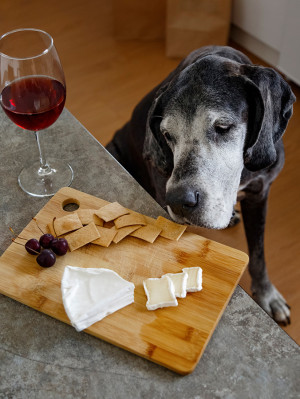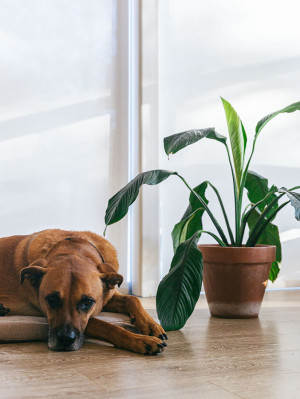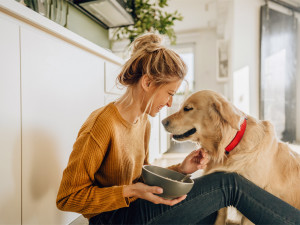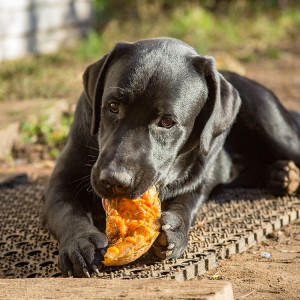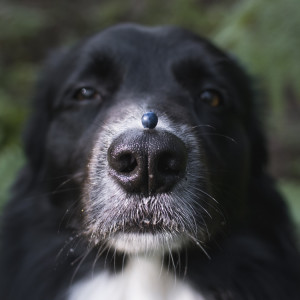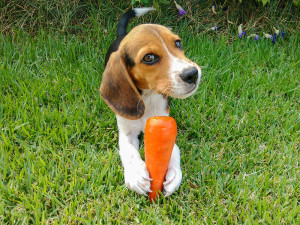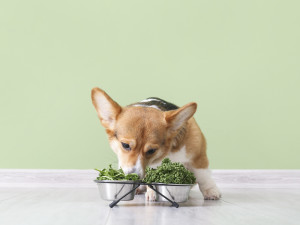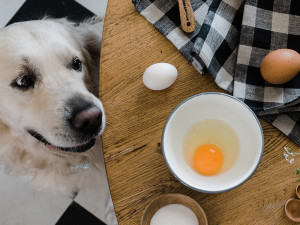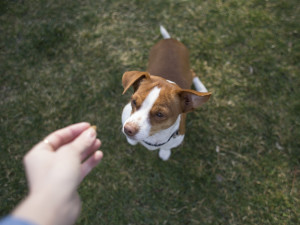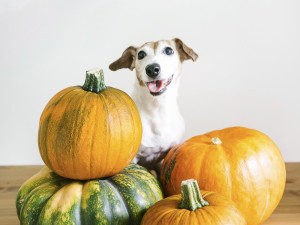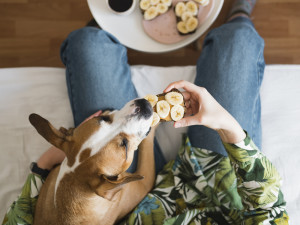Can Dogs Eat Popcorn?
Your pup wants in on movie night.
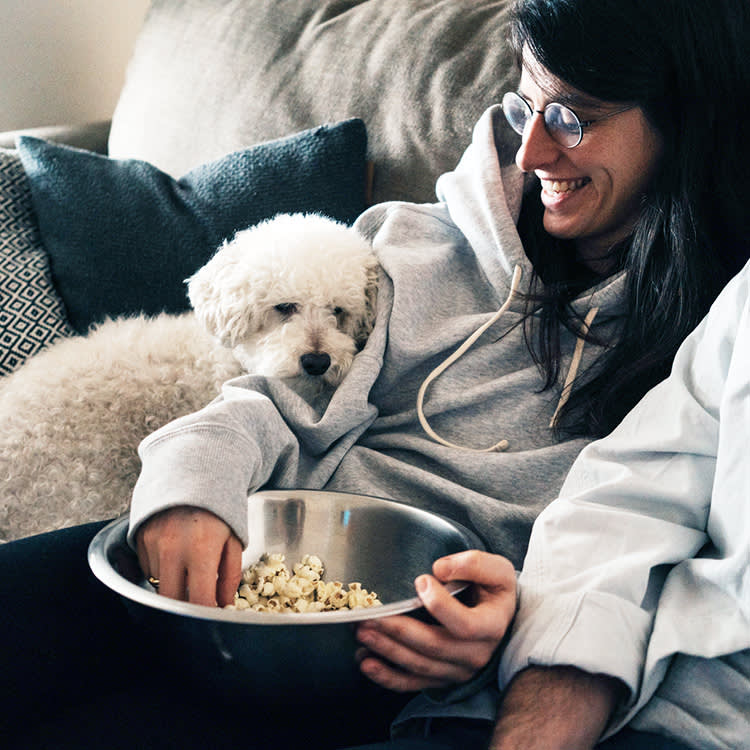
Share Article
Ordinarily, the sound of someone crunching and chewing loudly with their mouth open might be enough to make your skin crawl — but isn’t it adorable when your dog does it? If you love the cute way your dog chomps, and you don’t suffer from a serious case of misophonia, you might want to try sharing some new foods with your pup. Popcorn can be a good option if you abide by certain guidelines. It has a very satisfying crunch and can also provide some valuable health benefits. Read on to learn more about sharing popcorn with your pup.
Nutrition facts about popcorn for dogs
Popcorn is derived from specific types of corn that have just the right composition to pop into fluffy, crunchy morsels. This is usually a type of flint corn from the strain known as Zea mays evertaopens in a new tab, but sometimes other varieties are also popped including sweet corn and field corn.

littleKin™ is Kinship’s home just for puppy and kitten parents. Bop over to check out expert advice, new pet tools, and special deals—all curated for your newest family member.
opens in a new tabThe popcorn kernel contains a combination of starch and protein with a small amount of water and oil tightly wrapped with a thick outer hull. Once the kernels are heated to a high enough temperature, the water inside of them turns to steam, creating enough pressure to basically make the kernel explode. The result is that the starches and proteins expand into the fluffy shape we know and love to eat.
Most of what we consume is the starchy part of the kernel. These starches provide energy in the form of carbohydrates as well as fiber, both of which can be useful to dogs and people in moderation.
Is popcorn good for dogs?
Popcorn can be a good snack for some dogs, as long as you adhere to some basic safety guidelines. Like all snacks and treats, it should only be used in small portions, making up less than 10 percent of your dog’s total intake. This is because dogs need to get the bulk of their food in the form of a complete and balanced diet that will provide them with all of their dietary needs. If they eat too many treatsopens in a new tab or table scraps, they will miss out on critical nutrients, and this can lead to deficiencies in the long run. As an occasional treat, popcorn can be a fun addition to your dog’s menu and it may provide some nutritional benefits in the following ways:
Fiber: Popcorn contains a large amount of insoluble fiber from the indigestible plant matter in the kernels. This form of fiber helps to bulk up the stool and prevent constipationopens in a new tab. It also creates feelings of fullness and satisfaction without adding a lot of calories to the diet. This can be helpful for dogs who are on a weight-loss planopens in a new tab and need snacks that will be satisfying and low in calories.
Carbohydrates: Popcorn is mostly made up of starch, a form of carbohydrate. Carbohydrates are a good source of energy for dogs and because dogs are omnivores, they can use carbohydrates more effectively than say cats, who are carnivores. Dogs don’t have a specific carbohydrate requirement but typically get their energy from a combination of carbohydrates, proteins and fats.
Vitamins and minerals: Popped kernels also contain small amounts of iron, magnesium, and B vitamins, including B6 and folate. All of these are essential for dogsopens in a new tab. Luckily, commercial dog foods are required to provide adequate amounts of all of these and more, so whatever added nutrients they get from their snacks are a healthy bonus.
Can dogs eat un-popped kernels of popcorn?
Un-popped kernels are not toxic, but the hard outer hull is very difficult for dogs to chew and digest, making it a potential danger. If your dog were to swallow one or two kernels whole, they would likely be just fine. However, if they try to chomp on them, they could damage their teeth on that nearly indestructible hull, resulting in cracked or broken teeth.
Additionally, if your dog were to eat a large amount of un-popped kernels, they may have some digestive upset opens in a new tabincluding bloating, gas, vomiting and/or diarrhea as those kernels cannot be broken down and have to pass through their entire digestive tract to, er, make their final exit. Very large amounts of indigestible material can also cause impactions, which is like a form of constipation where all of that material gets stuck in the colon on the way out. In those cases, your dog may need help to pass all of it and should see a vet right away for supportive care.
Is popcorn completely safe for dogs?
Popcorn is safe for most dogs if it is the occasional snack, and so long as you are sharing air-popped, plain popcorn with them. There are important considerations to keep in mind when sharing popcorn with your pup including:
Salt content: Many store-bought varieties of popcorn contain a lot of salt, which can be unhealthy for your dog and may even lead to illness if they ingest enough salt. If you want to share popcorn with your dog, make it at home instead and skip the salt on your dog’s pieces.
Butter content: While there is nothing more delicious than hot, buttery popcorn, your dog needs to avoid the butter, too. High-fat foods, including certain oils and butter, can lead to digestive upset for your pup, including vomiting and diarrhea. In severe cases, this can also cause pancreatitisopens in a new tab.
Diacetyl: You may have heard about health concerns in people from microwave popcorn containing diacetylopens in a new tab. This is an ingredient used in the artificial butter flavoring that has been associated with lung diseaseopens in a new tab from chronic inhalation of the fumes. People and animals do not get sick from eating the popcorn, and this is only a concern after repeated exposures, such as for people working with the ingredients and regularly breathing in the fumes. The good news is that many of the big brands of microwave popcorn no longer use this ingredient at all.
Choking hazards: Popcorn is considered a choking hazard for small children because of the shape and texture of the popped kernels, and it can also be a choking hazard for dogs. Smaller dogs will be especially at risk for choking; they may have more trouble chewing up the popped corn, and their airways are smaller. For all dogs, it is a good idea to smash the kernels or break off smaller pieces to offer to your dog so they don’t have to struggle with trying to chew up big pieces.
Carbohydrate content: A small snack of popcorn on occasion is fine for most dogs. However, if you have a dog who needs to minimize their carb intake, such as a diabetic, the large amount of starch in popcorn can make it a poor choice for them. Be sure to consult your vet if you’re not sure whether or not your dog can have popcorn.
Other ingredients: In addition to avoiding butter and salt, be mindful of other ingredients that may be mixed in with popcorn and could be unsafe for dogs. This includes anything that may be toxicopens in a new tab, such as onions, garlic, or chocolate, as well as ingredients that are unhealthy for dogs such as very spicy seasoning and sugars used to make kettle corn or caramel corn.
The bottom line: Can dogs eat human food?
Dogs can eat many human foods and as long as you are mindful of choosing foods that are healthy and safe opens in a new tabfor your pup, it can be a fun experience to share snacks with your dog. Keep in mind that these should really be small snacks, and should not make up more than 10 percent of your dog’s diet. They need to get the bulk of their calories from a balanced dog food diet that will meet all of their nutritional needs.
Also, always double-check that foods you are offering are safe for dogs and do not contain any possible toxins. This is especially important with prepared foods that have many ingredients. And while there are many foods that are generally considered “safe” for dogs, each dog is an individual and may have their own unique reactions to certain foods. Therefore, it is important to start gradually with very small tastes of new foods to be sure your dog can tolerate it. Monitor your dog for signs of a reaction, such as gagging, vomiting, diarrhea, and/or swelling of the face.
Finally, when you are sharing snacks with your dog, try to do so in a way that encourages good behavior opens in a new tabfrom your dog. Instead of letting your dog beg at the table or jump in your lap while you’re eating, ask your dog to sit by their food bowl or go to their crate and then give them their portion of the snack in an appropriate location. This can serve as a built-in training session and helps teach your dog good habits, so you can also eat in peace. In most cases, your dog will love trying something new and getting to share in all the deliciousness of your snack.
Other foods that are safe for dogs
Pumpkin is a healthy and nutritious snackopens in a new tab for pups
Yogurt can be a great snackopens in a new tab with a probiotic boost
Carrots make a crunchy treatopens in a new tab, too
Other foods that are dangerous
Grapes and raisinsopens in a new tab are considered toxic for dogs and should never be shared
Avocado is actually not a good choiceopens in a new tab for dogs either
These foodsopens in a new tab should also be kept out of reach
FAQs (People also ask)
How much popcorn can a dog eat?
Popcorn should be an occasional snack food only and should be less than 10 percent of your dog’s daily food intake to ensure they get a balanced and complete diet.
Is it OK to give dogs popcorn?
It’s okay to offer plain, air-popped popcorn to dogs if you follow safe feeding guidelines. Popcorn with salt, butter, or other seasonings can be unhealthy for dogs and make them sick.
Why do dogs like popcorn?
Dogs may like the crunchy texture as well as the starchy taste of popcorn and may be curious to try it if they see you enjoying it.
Can dogs eat popcorn?
Dogs can eat plain air-popped popcorn in small amounts. There are some important factors to keep in mind when offering popcorn to your dog to keep them safe and healthy.
Is popcorn good for dogs?
Plain air-popped popcorn can be a healthy snack in small amounts since it contains lots of fiber and starch.
Can dogs eat un-popped kernels of popcorn?
They should not eat un-popped kernels as they can damage their teeth trying to chew on them and they can cause digestive problems.
Is popcorn safe for dogs?
Plain, air-popped popcorn is safe for dogs in small amounts but you should be mindful of any other ingredients that may be harmful to dogs and break popped kernels into small pieces to avoid risk of choking.
References:

Dr. Amy Fox, DVM
Amy Fox, DVM is a small animal veterinarian in New York City. A lifelong animal lover, Dr. Fox studied biology in college and then worked as a veterinary nurse before pursuing veterinary school at Cornell University. She has worked in many different settings including shelter medicine, emergency medicine, general practice, and animal cruelty and forensics. She is especially interested in nutrition, preventative medicine and care for senior pets. Dr. Fox also enjoys writing about veterinary medicine and teaching. In her free time she loves to cook, garden, and go for long runs.
Related articles
![Beagle puppy dog holding a peeled carrot in its front paws sitting in the grass]() opens in a new tab
opens in a new tabCan Dogs Eat Carrots?
Yep—this crunchy, sweet vegetable is a great addition to your dog’s diet.
- opens in a new tab
Can Dogs Eat Kale?
Yep — this superfood is good for your dog in small amounts.
![Golden retriever looks at some eggs on the counter]() opens in a new tab
opens in a new tabCan Dogs Eat Eggs and Eggshells?
Yes, eggs are a nutritious treat for dogs.
- opens in a new tab
Can Dogs Eat Almonds (and Other Nuts)?
This healthy snack for humans isn't so healthy for your pup. Here's why it's best to avoid them.
- opens in a new tab
Can Dogs Eat Pumpkin?
The superfood is delicious, and it’s a natural remedy for some common pup ailments.
- opens in a new tab
Can My Dog Eat Bananas?
Yep — bananas are a healthy and delicious treat for your pup.
